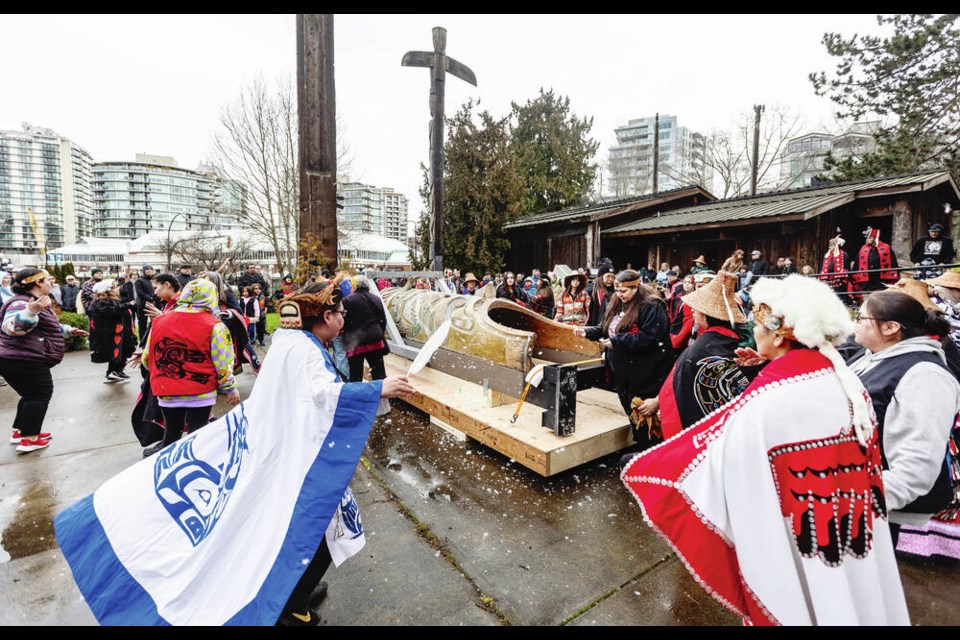Eagle down floated in the air outside the Royal B.C. Museum Monday morning as members of a First Nation from the Central Coast readied a totem pole to come home after more than a century in the museum’s collection.
The totem pole was hoisted out of a museum window by a crane and lowered to the ground, where it was unwrapped in front of Nuxalk people, some of whom had travelled from their territory near Bella Coola to welcome the totem.
Nuxalk Hereditary Chief Snuxyaltwa, who also goes by Deric Snow, said it brought tears to his eyes watching the pole leave the museum.
“I can see a lot of hearts are lifted today. People are happy,” Snow said.
The pole was carved in the mid-1800s by Louie Snuxyaltwa, Snow’s great-grandfather and one of the last gifted spiritual carvers in the Nuxalk homeland of South Bentinck (Talleomy). Snow, who spearheaded the effort to repatriate the totem pole, has said his great-grandfather’s spirit is still in it and can’t be at rest until the pole returns to Nuxalk territory.
After it came out of the building, the pole was moved to lie next to the Mungo Martin longhouse, adjacent to the museum, where women from Nuxalk performed a ceremony to bless and awaken the pole. Rubbing eagle feathers on the wood, they danced around the totem while others drummed and sang.
Nuxalk member Bill Tallio called it “a dream come true,” for the nation to see the pole being returned home, and “a huge healing step.”
Speaking to a crowd inside the longhouse, Snow said the totem pole is the nation’s story book.
“It tells us who we are,” he said. It contains “the story of each river, mountain and creek on our territory.”
The pole was taken from the Nuxalk homeland south of Bella Coola when people were forced to relocate after a smallpox epidemic around 1900.
It was initially a longhouse entrance pole, before being moved to a grave site.
The museum reportedly paid $45 for the pole, which was brought south around 1912 and housed in the museum’s collections.
Following two days of ceremony at the Mungo Martin longhouse, the pole will be transported to Nuxalk territory via Williams Lake, where a convoy will meet the truck transporting it to complete the journey to Bella Coola. The nation plans to keep the totem pole in the school in Bella Coola for about a year, while working on a replica. The original is intended to return to South Bentinck in May 2024, while the replica will likely remain in the school, Snow said.
Just over three years have passed since Snow and three other hereditary chiefs travelled to the museum to request the return of this totem pole, a second one and other cultural artifacts. Frustrated by slow progress, the nation initated a lawsuit in February 2022.
Those gathered inside the longhouse erupted in applause and cheers when Snow was handed an envelope with a letter from the museum acknowledging the pole’s return.
The letter, signed by the museum’s CEO Alicia Dubois, said the museum understands the process of returning the totem pole has not been an easy one and apologized for the difficulties in reaching this point.
The Royal B.C. Museum did not make anyone available for an interview Monday.
Murray Rankin, B.C.’s minister of Indigenous relations and reconciliation, who attended the ceremony with MLAs Jennifer Rice, who represents the North Coast, and Lana Popham, minister of tourism, arts, culture and sports, called it a “long overdue day.”
While the nation is celebrating the return of the totem pole, they’re still waiting for repatriation of other items, Nuxalk elected Chief Samuel Schooner said.
“What we witnessed today is ‘reconciliaction,’ and that’s what we need to see more of. We need a house for our artifacts, so we can start bringing them all home,” he said.
— With files from Darron Kloster
>>> To comment on this article, write a letter to the editor: [email protected]




